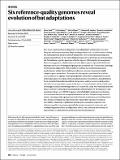Six reference-quality genomes reveal evolution of bat adaptations
Abstract
Bats possess extraordinary adaptations, including flight, echolocation, extreme longevity and unique immunity. High-quality genomes are crucial for understanding the molecular basis and evolution of these traits. Here we incorporated long-read sequencing and state-of-the-art scaffolding protocols1 to generate, to our knowledge, the first reference-quality genomes of six bat species (Rhinolophus ferrumequinum, Rousettus aegyptiacus, Phyllostomus discolor, Myotis myotis, Pipistrellus kuhlii and Molossus molossus). We integrated gene projections from our 'Tool to infer Orthologs from Genome Alignments' (TOGA) software with de novo and homology gene predictions as well as short- and long-read transcriptomics to generate highly complete gene annotations. To resolve the phylogenetic position of bats within Laurasiatheria, we applied several phylogenetic methods to comprehensive sets of orthologous protein-coding and noncoding regions of the genome, and identified a basal origin for bats within Scrotifera. Our genome-wide screens revealed positive selection on hearing-related genes in the ancestral branch of bats, which is indicative of laryngeal echolocation being an ancestral trait in this clade. We found selection and loss of immunity-related genes (including pro-inflammatory NF-κB regulators) and expansions of anti-viral APOBEC3 genes, which highlights molecular mechanisms that may contribute to the exceptional immunity of bats. Genomic integrations of diverse viruses provide a genomic record of historical tolerance to viral infection in bats. Finally, we found and experimentally validated bat-specific variation in microRNAs, which may regulate bat-specific gene-expression programs. Our reference-quality bat genomes provide the resources required to uncover and validate the genomic basis of adaptations of bats, and stimulate new avenues of research that are directly relevant to human health and disease1.
Citation
Jebb , D , Huang , Z , Pippel , M , Hughes , G M , Lavrichenko , K , Devanna , P , Winkler , S , Jermiin , L S , Skirmuntt , E C , Katzourakis , A , Burkitt-Gray , L , Ray , D A , Sullivan , K A M , Roscito , J G , Kirilenko , B M , Dávalos , L M , Corthals , A P , Power , M L , Jones , G , Ransome , R D , Dechmann , D K N , Locatelli , A G , Puechmaille , S J , Fedrigo , O , Jarvis , E D , Hiller , M , Vernes , S C , Myers , E W & Teeling , E C 2020 , ' Six reference-quality genomes reveal evolution of bat adaptations ' , Nature , vol. 583 , no. 7817 , pp. 578-584 . https://doi.org/10.1038/s41586-020-2486-3
Publication
Nature
Status
Peer reviewed
ISSN
0028-0836Type
Journal article
Description
Funding: E.W.M. and M.P. were supported by the Max Planck Society and were partially funded by the Federal Ministry of Education and Research (grant 01IS18026C). All data produced in Dresden were funded directly by the Max Planck Society. S.C.V., P.D. and K.L. were funded by a Max Planck Research Group awarded to S.C.V. from the Max Planck Society, and a Human Frontiers Science Program (HFSP) Research grant awarded to S.C.V. (RGP0058/2016). M.H. was funded by the German Research Foundation (HI 1423/3-1) and the Max Planck Society. E.C.T. was funded by a European Research Council Research Grant (ERC-2012-StG311000), UCD Wellcome Institutional Strategic Support Fund, financed jointly by University College Dublin and SFI-HRB-Wellcome Biomedical Research Partnership (ref 204844/Z/16/Z) and Irish Research Council Consolidator Laureate Award. G.M.H. was funded by a UCD Ad Astra Fellowship. G.J. and E.C.T. were funded from the Royal Society/Royal Irish Academy cost share programme. L.M.D. was supported by NSF-DEB 1442142 and 1838273, and NSF-DGE 1633299. D.A.R. was supported by NSF-DEB 1838283. E.D.J. and O.F. were funded by the Rockefeller University and the Howard Hughes Medical Institute.Collections
Items in the St Andrews Research Repository are protected by copyright, with all rights reserved, unless otherwise indicated.
Related items
Showing items related by title, author, creator and subject.
-
Next-gen sequencing identifies non-coding variation disrupting miRNA-binding sites in neurological disorders
Devanna, P; Chen, X S; Ho, J; Gajewski, D; Smith, S D; Gialluisi, A; Francks, C; Fisher, S E; Newbury, D F; Vernes, S C (2018-05) - Journal articleUnderstanding the genetic factors underlying neurodevelopmental and neuropsychiatric disorders is a major challenge given their prevalence and potential severity for quality of life. While large-scale genomic screens have ... -
Giardia secretome highlights secreted tenascins as a key component of pathogenesis
Dubourg, Audrey; Xia, Dong; Winpenny, John P; Al Naimi, Suha; Bouzid, Maha; Sexton, Darren W; Wastling, Jonathan M; Hunter, Paul R; Tyler, Kevin M (2018-03) - Journal articleBackground: Giardia is a protozoan parasite of public health relevance that causes gastroenteritis in a wide range of hosts. Two genetically distinct lineages (assemblages A and B) are responsible for the human disease. ... -
Discovery of the first genome-wide significant risk loci for attention deficit/hyperactivity disorder
ADHD Working Group of the Psychiatric Genomics Consortium (PGC); Early Lifecourse & Genetic Epidemiology (EAGLE) Consortium; 23andMe Research Team; Kent, Lindsey (2019-01) - Journal articleAttention deficit/hyperactivity disorder (ADHD) is a highly heritable childhood behavioral disorder affecting 5% of children and 2.5% of adults. Common genetic variants contribute substantially to ADHD susceptibility, but ...

